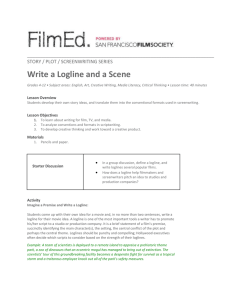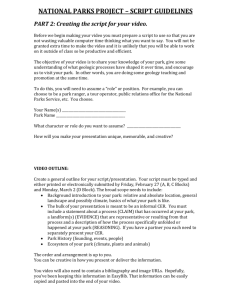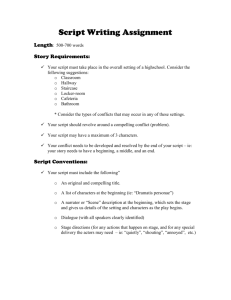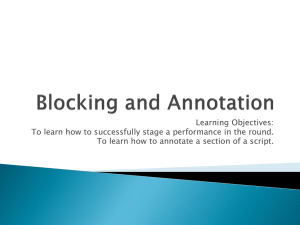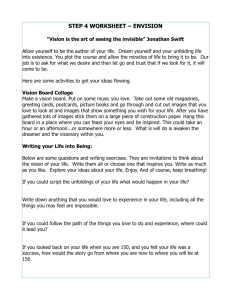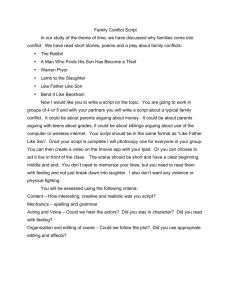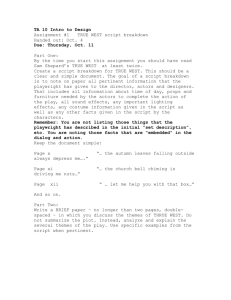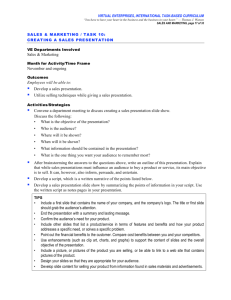November / December 2008 - PAGE International Screenwriting
advertisement
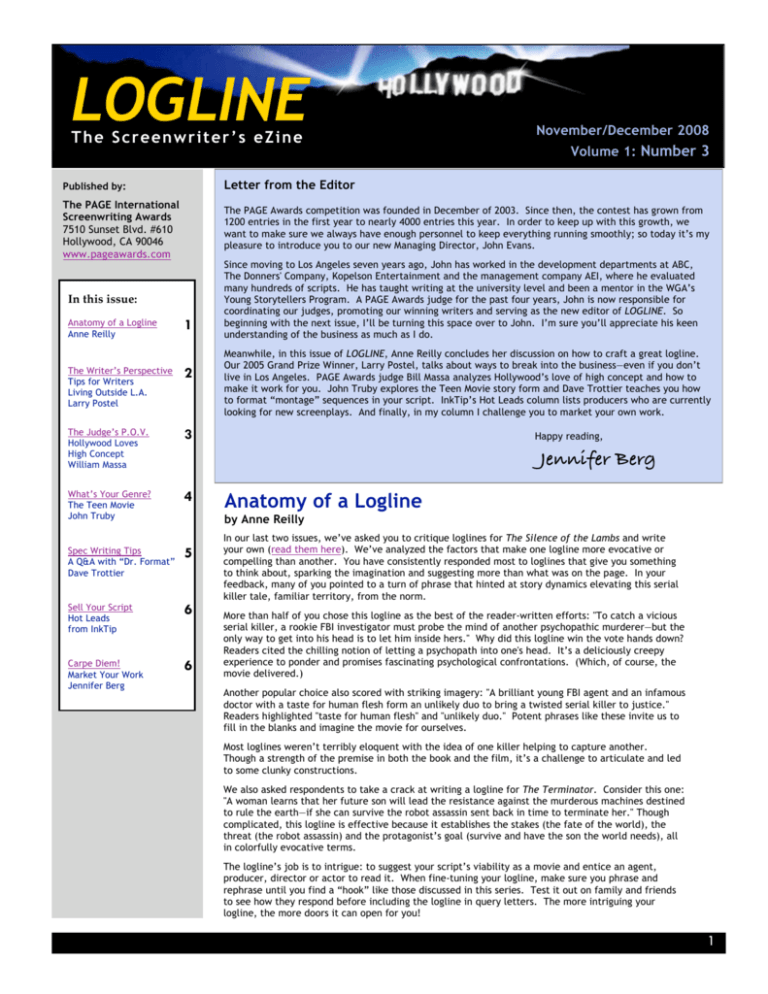
LOGLINE The Screenwriter’s eZine November/December 2008 Volume 1: Number 3 Published by: Letter from the Editor The PAGE International Screenwriting Awards 7510 Sunset Blvd. #610 Hollywood, CA 90046 www.pageawards.com The PAGE Awards competition was founded in December of 2003. Since then, the contest has grown from 1200 entries in the first year to nearly 4000 entries this year. In order to keep up with this growth, we want to make sure we always have enough personnel to keep everything running smoothly; so today it’s my pleasure to introduce you to our new Managing Director, John Evans. In this issue: Anatomy of a Logline Anne Reilly 1 The Writer’s Perspective Tips for Writers Living Outside L.A. Larry Postel 2 The Judge’s P.O.V. Hollywood Loves High Concept William Massa 3 What’s Your Genre? The Teen Movie John Truby 4 Since moving to Los Angeles seven years ago, John has worked in the development departments at ABC, The Donners' Company, Kopelson Entertainment and the management company AEI, where he evaluated many hundreds of scripts. He has taught writing at the university level and been a mentor in the WGA’s Young Storytellers Program. A PAGE Awards judge for the past four years, John is now responsible for coordinating our judges, promoting our winning writers and serving as the new editor of LOGLINE. So beginning with the next issue, I’ll be turning this space over to John. I’m sure you’ll appreciate his keen understanding of the business as much as I do. Meanwhile, in this issue of LOGLINE, Anne Reilly concludes her discussion on how to craft a great logline. Our 2005 Grand Prize Winner, Larry Postel, talks about ways to break into the business—even if you don’t live in Los Angeles. PAGE Awards judge Bill Massa analyzes Hollywood’s love of high concept and how to make it work for you. John Truby explores the Teen Movie story form and Dave Trottier teaches you how to format “montage” sequences in your script. InkTip’s Hot Leads column lists producers who are currently looking for new screenplays. And finally, in my column I challenge you to market your own work. Happy reading, Jennifer Berg Anatomy of a Logline by Anne Reilly Spec Writing Tips A Q&A with “Dr. Format” Dave Trottier 5 Sell Your Script Hot Leads from InkTip 6 Carpe Diem! Market Your Work Jennifer Berg 6 In our last two issues, we’ve asked you to critique loglines for The Silence of the Lambs and write Also,own make surethem you take a look at InkTip’s column, listingone producers who are currently your (read here). We’ve analyzedHot theLeads factors that make logline more evocative or looking for new screenplays. And as check out my column. most In this I show tools you need to compelling than another. Youalways, have consistently responded to issue loglines thatyou givethe you something to think and about, the imagination and suggesting more than what was on the page. In your market sellsparking your screenplay. feedback, many of you pointed to a turn of phrase that hinted at story dynamics elevating this serial killer tale, familiar territory, from the norm. . More than half of you chose this logline as the best of the reader-written efforts: "To catch a vicious serial killer, a rookie FBI investigator must probe the mind of another psychopathic murderer—but the only way to get into his head is to let him inside hers." Why did this logline win the vote hands down? Happy reading, Readers cited the chilling notion of letting a psychopath into one's head. It’s a deliciously creepy Jennifer Berg experience to ponder and promises fascinating psychological confrontations. (Which, of course, the movie delivered.) Another popular choice also scored with striking imagery: "A brilliant young FBI agent and an infamous doctor with a taste for human flesh form an unlikely duo to bring a twisted serial killer to justice." Readers highlighted "taste for human flesh" and "unlikely duo." Potent phrases like these invite us to fill in the blanks and imagine the movie for ourselves. Most loglines weren’t terribly eloquent with the idea of one killer helping to capture another. Though a strength of the premise in both the book and the film, it’s a challenge to articulate and led to some clunky constructions. We also asked respondents to take a crack at writing a logline for The Terminator. Consider this one: "A woman learns that her future son will lead the resistance against the murderous machines destined to rule the earth—if she can survive the robot assassin sent back in time to terminate her." Though complicated, this logline is effective because it establishes the stakes (the fate of the world), the threat (the robot assassin) and the protagonist’s goal (survive and have the son the world needs), all in colorfully evocative terms. The logline’s job is to intrigue: to suggest your script’s viability as a movie and entice an agent, producer, director or actor to read it. When fine-tuning your logline, make sure you phrase and rephrase until you find a “hook” like those discussed in this series. Test it out on family and friends to see how they respond before including the logline in query letters. The more intriguing your logline, the more doors it can open for you! 1 REGARDING SCREENWRITING The Writer’s Perspective: Tips for Writers Living Outside L.A. by Larry Postel Breaking into this business is extremely difficult—no matter where you live. But living outside Los Angeles makes it even tougher. As a Dallas-based writer with well over 20 years of experience, I’d like to share some thoughts and ideas that I hope will be helpful for my fellow out-of-town writers: The Writer’s Journey: Onyour Patience 1. Choose concept Larry Postel won the 2005 wisely. Selling a spec is your by Drina Connors Kay best chance to break in, so PAGE Awards Grand Prize for his family comedy X-Mas Files. Larry sold the script to Land Marvel Animation in India through a direct referral from PAGE, and the film is currently in production as a 3-D animated feature. Larry also has two other screenplays under option and is putting the final touches on a low budget thriller. write the best, most commercial spec script you can. Maximize your potential for a sale with a high concept that can be produced on a lowto-medium budget. High concept doesn’t mean formulaic, as many writers believe. It means a simple idea with that “wow” factor. Something the filmmakers could sell to investors, distributors, producers, talent— or even dentists looking to buy their way into the film business. A couple of years ago, I was lucky enough to sell a spec. It was a high concept, studio-type Christmas comedy that could be done on a low-to-medium budget. Though many Hollywood producers and agents said they loved it, the consensus was that no studio would buy it, mainly because studios prefer adaptations or sequels for their big holiday releases. I ended up selling my script to a company in India that plans to turn it into a 3-D animated film. Hooray for Bollywood! Writing commercial stories with budgets that can be raised independently is a much more realistic way to break into the business than writing big budget, studio-type films, especially for writers living outside Southern California. 2. Be careful whom you do business with. The major agencies and management firms are located in L.A. and a few have offices SCREENWRITING with William Goldman The legendary screenwriter and storyteller takes you on an amazing journey through his adventures in Hollywood. Among the subjects discussed: what makes a movie work, dealing with writer's block, movie stars, studios, who you can trust, and much more… DVD (90 minutes) Special offer for LOGLINE readers: Get a 10% DISCOUNT on all the great products at the Writers Store! When ordering, simply type in Promotion Code: LOGLINE in London or New York. While there are agencies based in other cities, I’ve never seen a major sale involving one. Over the years, I’ve had a few out-of-town agents, including one here in Dallas. Not one turned out to have valuable connections in the industry, whatever they told me when I signed. They ended up cold-calling Hollywood producers, which I could have done a better job of myself. So avoid signing with any agency or manager outside L.A. or New York, even if they are a WGA signatory. The major players won’t take you seriously, as I learned myself. Remember: It’s a business of relationships, and if a rep doesn’t have any, that’s not the rep for you. Instead, focus on getting your script into producers’ hands. If you’re lucky enough to land a decent sale, you’ll get representation. “Writing commercial stories with budgets that can be raised independently is a much more realistic way to break into the business.” By the same token, watch out for so-called producers with “screenwriter wanted” postings on craigslist, mandy.com and other websites. Some of these producers are legit, but many are not. Many will shower you with praise, then offer you bupkus to rewrite your script to their satisfaction. Several years ago, I accepted a dollar option from a so-called producer in Hollywood who claimed to have a deal with a major studio and $140 million in funds through a foreign investment group. I bought his story hook, line and sinker, spent the next year rewriting, and in the end, I found out that he was a total fraud. No deal, no funds. He was just a wannabe spinning writers’ wheels (turns out I wasn’t the only writer he had doing free rewrites on dollar options). I should have known better. Thoroughly research producers online and don’t be afraid to ask direct questions about their background. As an unknown writer, you probably won’t make much money at first but what matters is that you work only with credible professionals. 3. Be creative in marketing yourself. As writers living outside L.A., we can’t network face-to-face with working producers, so we have to find other opportunities. Use online resources like InkTip to get your script in front of industry insiders. Join screenwriters’ message boards—you never know where a referral or hot tip will come from. Enter legitimate contests that will get you industry exposure. It was only after winning the PAGE competition in 2005 that I sold my script to the Indian production company, thanks to a direct referral from the good people at PAGE. My contest win also resulted in several requests from top-flight producers and agents. So leave no stone unturned when it comes to marketing. If you’re talented and persistent, good things will come—even if you don’t live in L.A. Best of luck! Protect your original work! Instantly establish the date and time-of-creation of all your files, including screenplays. (Not valid on gift certificates, live courses or seminars, or products already on sale) 2 REGARDING SCREENWRITING The Judge's P.O.V.: Hollywood Loves “High Concept” by William Massa Many screenplays that I come across feature good writing, engaging storylines and intriguing characters, but still fail right out of the starting gate. Why? Unfortunately, they lack a unique story hook that manages to be both gimmicky and intriguing. Your script needs to be more than a good story well told. Without a strong high concept, the deck is stacked against the writer. material (books, graphic novels, video games) or they are passion projects for established talent. As a newcomer, you are fighting an uphill battle through the slush pile. How can you distinguish your work and jump to the top of the heap? What exactly does “high concept” mean? Of course, having a high concept won’t sell a poorly executed screenplay, but it is often a prerequisite to getting noticed in Hollywood. Like so much in life, it all starts with a great idea. The Writer’s Journey: On Patience by Drina Connors Kay Every script has an inherent Writer William Massa has sold both specs and pitches and done uncredited work on Anacondas: The Hunt for the Blood Orchid (2004) and the NBC telefilm “Bet Your Life.” He is one of the first writers to tackle navigational cinema, an exciting new technology for Blu-ray Disc, in his 2007 film Return to the House on Haunted Hill. Massa has concept, but for mainstream Hollywood’s purposes, that concept has to be both familiar and feature a fresh twist that jumps right out at us. In other words, the writer should be aware of the formulas and expectations, yet add something new to the genre. The greatest challenge is walking this tightrope between what's unique and what's familiar. If the script is too different, it won’t feel like what has worked in the past, but if it’s too familiar, it will play like a ripoff. Answer: With a strong high concept. “The trick is to find a unique element within a familiar story structure, producing a fresh combination that is easily summarized.” BEFORE YOU SUBMIT YOUR SCRIPT, FIND OUT HOW HOLLYWOOD WILL RESPOND… For a limited time, you now have the opportunity to receive detailed notes from top industry script readers and story analysts: the same people who judge the PAGE Awards each year. Order Feedback from up to three different judges, all for a price far less than most script consultants charge. projects in development at Let’s give a movie idea the highconcept treatment. Let’s say you’re writing a story about a is in the final polish stage New York City bike messenger. A on a new spec. low-concept treatment of this idea might produce the following logline: “A New York bike messenger tries to survive in the big city.” Imprint and Dark Castle and In this logline, the protagonist clearly has an interesting job with some visual potential, but nothing about the concept really stands out. This story might make a great drama or indie, but it’s execution-dependent, meaning the script must be stellar just to have a chance in the marketplace. A more high-concept version of this story could go like this: “A bike messenger in Manhattan is forced by a corporate assassin to deliver three bombs, each with a ticking clock, or the assassin will deliver a bomb of his own to the messenger’s family. Speed meets Collateral.” This concept jumps right out at us and we can immediately see the movie poster or trailer. It’s a full-fledged movie idea that can easily be pitched to executives and ultimately marketed to a jaded movie-going public. Actually, this is the concept for a spec (C.O.D., by Lars Jacobson) that sold earlier this year. New writer, first-time sale! I bet the underlying idea of his spec had something to do with its success. The truth is, if cooking up a winning high concept were easy, everyone would be doing it. The trick is to find a unique element within a familiar story structure, producing a fresh combination that is easily summarized. If you’re struggling to come up with a dynamic logline or cool title, the script may lack a solid high concept. Now your reaction to all this might be, “There are many ‘lowconcept’ movies produced every year in Hollywood! Movies driven by great characters and solid execution, not premise.” This is true. But most of these projects are based on underlying JUDGE'S FEEDBACK (3-5 pages) The same great Feedback we offer in conjunction with the contest. Your judge will discuss the strengths and weaknesses of your script, explain how he or she would score your script if you submitted it to the contest, tell you whether your script would receive a Recommend, Consider or Pass if you submitted it to his or her agency or production company, and offer suggestions and ideas on how to further develop the material. CONCEPT EVALUATION (2-3 pages) Notes on your treatment, outline, or story idea. (PLEASE NOTE: This is not for completed screenplays.) Your judge will discuss the strengths and weaknesses of your concept, evaluate your treatment or outline, offer suggestions and ideas on how best to develop the material, and evaluate the script's ultimate marketing potential. Concept Evaluation is designed to help you discover any potential pitfalls and resolve problems before you sit down to write the script. IN-DEPTH SCRIPT ANALYSIS (8-10 pages) A comprehensive assessment of your screenplay. Your judge will discuss the strengths and weaknesses of your script, provide you with detailed examples and page notes, and offer suggestions and ideas on how to further develop the material. In-Depth Analysis is designed for writers who have received Judge's Feedback from one of our judges in the past and who now wish to receive more detailed notes from that judge, and for writers looking for professional help with their rewrite. Learn more... 3 ASK THE EXPERTS What’s Your Genre? The Teen Movie by John Truby One of the first rules of success is choosing a story form Hollywood wants to buy. Certainly one of those forms is the teen movie, as popular now as ever, in television as well as in film. The first thing to understand about teen movies is that they aren't actual genres. They are stories about a major kind of character change. In the Great Screenwriting Class, I talk about the five great character changes in storytelling, and this one is known as "coming of age." Here someone changes from child to adult—not physically, but emotionally and morally. The Writer’s Journey: On Patience Over the course of three decades, John Truby has taught more than 30,000 students the art of screenwriting. Using the knowledge and expertise he has applied as a consultant on over 1,000 movie scripts, he offers an approach to storytelling that has earned worldwide acclaim for his instructional courses and screenwriting software. He is also the author of The Anatomy of Story. Booklist raves, "Truby's tome is invaluable to any writer looking to put an idea to paper." To learn more about John Truby's classes, screenwriting software, and story consultation services, visit : www.truby.com Teen movies focus on the first stage of becoming an adult, which involves learning how to break free of conformity and become an individual. What's changed over the years is the nature of that conformity. In the movie, Rebel Without a Cause, it was the conformity of the parents' world, the 9-tobyoriginal Drinateen Connors Kay 5 job, the man in the gray flannel suit. The Graduate (essentially a teen movie even though the hero is a college grad) continued this basic contrast, with the parents' world portrayed as even richer and more morally bankrupt ("plastics"). American Graffiti, probably the best teen movie ever made, was a turning point. Within the strict confines of small town America, the conformity changed to being primarily among the teens themselves. Looking at the current teen movie, you might not realize that the form is as old as storytelling, going all the way back to the myth stories of the boy becoming king and the girl becoming queen. Teen movies are always connected to some genre, usually comedy (Ferris Bueller's Day Off, Porky's, Fast Times at Ridgemont High, American Pie) or romantic comedy (Superbad, Juno, Clueless, She's All That, Legally Blonde, Risky Business), but also straight drama (Rebel Without a Cause, Romeo and Juliet) and even horror (Carrie) and fantasy (Back to the Future, Harry Potter). The deeper lesson of these stories is how one learns to become a unique and moral individual. This element is easiest to see when the teen movie is done as a romantic comedy. The male hero's goal is sex. But his need is to learn to leave his male friends and their reptilian views of all women behind and form a new community with one woman, who will show him the power and value of intimacy and help him find and take pride in his true individuality. The lead female in teen romantic comedies has usually been the beautiful object of affection for the boy. Or, in a slight variation, she appears to be a nerd but is really a beauty underneath. Especially in teen romances of the last decade, the heroine has erased the classic distinction between the smart outcast and the pretty bimbo. Instead, the outcast and the pretty girl are one and the same. Most prominently in Legally Blonde (a teen movie even though it's set in law school), the lead is both smart and pretty. This girl embraces her looks and is proud to use her unique strengths as a woman. She is opposed by other beautiful girls, but they are petty, jealous and lack one trait the lead has always had: compassion. Teen love stories are often about the difference between true class and false class. False class comes from looks and money. True "class" comes from character. These stories say it’s okay to want beauty and money and to try to get them, but you have to go after them in a decent way. Learn more from John Truby… The Anatomy of Story In his long-awaited first book, Truby shares all his secrets for writing a compelling script, focusing on plot and premise, themes, characters, moral development, and crafting the kind of ending that brings audiences back again and again. Learn more... Blockbuster Software No matter how good a writer you are, Blockbuster software will revolutionize the way you write. This multi-level creative writing tool puts over 300 professional techniques at your fingertips to help you create a great story in a fraction of the usual time and effort. Learn more... Great Screenwriting Class Learn hundreds of professional techniques that will allow you to compete with the best! This flagship course of the Truby Writer's Studio, taken by over 20,000 students worldwide, wins awards year after year as the best writing class in America. (Available on DVD or Audio CD) Learn more... Get a 10% DISCOUNT at the Writers Store! Use Promotion Code: LOGLINE 4 ASK THE EXPERTS Dave Trottier has sold screenplays and developed projects for The Walt Disney Company, Jim Henson Pictures, York Entertainment, On the Bus Productions, Hill Fields and New Century Pictures. As a script consultant he has helped dozens of clients sell their work and win awards. His book The Screenwriter’s Bible, now in its fourth edition, is perhaps the most comprehensive industry guide on the market. To learn more about Dave Trottier's books, classes and mentoring services, visit: www.keepwriting.com MONTAGE - JIM & SUZY FALL IN LOVE Spec Writing Tips by Dave Trottier READER’S QUESTION: I’m at the point in my romantic comedy where two characters get together and fall in love. I want to show that two months go by through the things they do: going on a picnic, walking on the beach, etc. Usually, in actual movies, there is music here. How do Iby write the sequence so the Kay producers and director know what Drina Connors I’m after? The Writer’s Journey: On Patience DAVE’S ANSWER: You are referring to the montage device, which uses specific shots to show “passage of time,” “falling in love” or any other concept. Here’s an example: It assumes the entire scene is in one location, Burt's room. Also, instead of using BURT as a secondary scene heading (as I do below), I could write BACK TO SCENE or BACK TO BURT. -- At a picnic in the park, Jim and Suzy wolf down an entire chicken in record time. Their affectionate countenances are smeared with chicken fat. -- Jim (now with two-months growth of beard) and Suzy jog along the beach until they come upon a beached whale. Together, they push the huge mammal back into the ocean. The whale waves its tail in grateful thanks. Jim and Suzy wave back. And so on. (You did say this was a comedy, right?) To show the passage of time, I used a beard in the above example, but you don’t need to be so obvious. Normally, show passage of time by how the relationship grows or deteriorates. A classic example is the breakfast montage in Citizen Kane. Obviously, time is passing. In both A Man for All Seasons and A Beautiful Mind, there are short montages of the seasons changing. Incidentally, you should not indicate music in your montage. The director, composer, or producer will recognize the opportunity to insert a hit song. The TV Writers Vault The Screenwriter’s Bible 4th Edition Pitch your Television Show Concepts and Scripts Today! Used by Over 90 Top Production Companies and TV Networks For more information, visit: www.TVWritersVault.com A wealth of information in one indispensable guide, The Screenwriter's Bible provides you with crystal clear explanations of script formatting and screenwriting fundamentals, including dozens of useful worksheets, checklists, marketing advice, sample query letters, and the latest on the new spec style. The one book every aspiring screenwriter must own. Get a 10% DISCOUNT at the Writers Store! Use Promotion Code: LOGLINE 5 CAREER OPPORTUNITIES Carpe Diem! Market Your Work by Jennifer Berg Sell Your Script Hot Leads from InkTip NOTE: Please submit your work only if it seems like a perfect fit for these companies’ needs. If you aren’t sure your script meets their criteria, please check with jerrol@inktip.com before submitting it. HOW TO SUBMIT YOUR SCRIPT: 1. Go to http://www.inktippro.com/leads/ 2. Enter your email address 3. Copy/Paste the corresponding code The Writer’s Journey: On Patience Infinity Pictures by Drina Connors Kay [code: cfxkqzegw7] We are looking for completed, feature-length comedy scripts from Australian writers who have won festivals or received good coverage. Submissions must be unique, character-driven stories in the vein of Knocked Up and Heartbreak Kid, not plot-driven. Budget will not exceed $6 million (USD). Script must be fully written either by an Australian resident or Australian citizen. Our credits include the feature Sally Marshall Is Not an Alien. StreetReady Entertainment It seems writers never like to market their own work. They love to write, but don’t want to have to promote what they’ve written. Instead, I hear them sitting around Starbucks moaning, “I hate trying to sell my own stuff! I just want an agent or manager to do it for me.” The Writer’s Journey: On Patience Sound familiar? Are you one of those writers waiting for that elusive Hollywood prince to come along and sweep you off your feet? Well, I’mby afraid that could be one very long wait. So I say, “Snap out of Drina Connors Kay it!” Take your career in your own hands. To get an agent or manager, you’re going to have to do some serious self-promotion. In fact, odds are you’ll have to land your first deal before any rep will even consider you. Remember, an agent or manager will be working for you with no compensation until he or she actually sells your script or your writing services. So it’s your job to prove that you’re a writer who is worth this time and effort. How do you do that? First, you need the right mindset to overcome your “seller’s block.” Look in the mirror and ask, “Why do I hate marketing myself?” Be honest. Is it because you’re afraid your scripts aren’t really that good, or that people won’t like them? Do you fear rejection? Or success? Is it because you’re deathly shy? Or just plain lazy? Whatever your reason is, just face it. And then make a decision. Ask yourself, “How much do I want this? Do I want it badly enough to do the necessary work, despite my fears and insecurities?” If not, head on over to Starbucks and enjoy your latte! But if you’re truly committed to advancing your career, read on… [code: unvcevf1cy] Here’s how to get started: We are looking for completed feature-length, limited-location romantic comedy scripts. Submissions must be family friendly, in the vein of Dan in Real Life, not Wedding Crashers. Please don’t submit material containing raunchy humor or that would garner more than a PG rating. Script must take place in 1-3 locations, so stories that take place mostly in a home and/or office are ideal. 1) Hire yourself. You’re now your own agent. Write yourself a contract scheduling three to five hours a week for this job. Sign it. This is your commitment to yourself. WGA and non-WGA writers may submit. Budget will not exceed $1 million. Erik Bauer Productions [code: zw0dadttcm] We are looking for writers who can craft a feature-length screenplay based on an existing political drama treatment. We are interested in writing samples that demonstrate a flare for dialogue and character development. Knowledge of radical Islam culture is a plus. WGA and non-WGA writers may submit. The pay is $2,000 against 3% of the film's budget. Financing is already in place to produce the film. Erik Bauer is the Founding Publisher and Editor of Creative Screenwriting Magazine. He also produced the feature film Hard Scrambled, staring Kurtwood Smith (Robocop, "That '70s Show"). *** InkTip Works! *** Every week, three scripts are optioned and/or writers are hired through contacts made on InkTip.com. To date, over 70 films have been produced as a result of InkTip leads. Take your career to the next level! Register now at www.InkTip.com 2) Get the tools you need. For lists of who’s who in Hollywood and their contact information, you’ll need the Hollywood Creative Directory and Representation Directory. You’ll also need to learn how to write query letters and pitch your script, so pick up a couple of good books like Michael Hauge’s Selling Your Story in 60 Seconds and Michael Lent’s Breakfast with Sharks. Everyone knows that IMDb is an amazing resource, but to get the inside scoop on the players and their projects in development, go one step further and sign up for IMDb Pro. And for a real leg up on your job, sign up with one or more of these terrific online script sales services: InkTip, SellAScript and the TV Writers Vault. (For more suggestions and ideas, review our list of Recommended Resources.) 3) Choose your work schedule and stick to it. Put your weekly hours in the calendar and consider them a high-priority appointment. Use the first half of your work time for research. Go online for industry news. Follow current trends, paying special attention to your genre and projects like your own. Then use the second half of your session to take action. Send query letters to appropriate producers and production companies. Pitch your work via phone and email. Place your script on the script sales websites. If someone requests your script, send it out with a compelling cover letter. Do this every week. After seeing some progress, you may be so inspired that you start putting in overtime! Embrace this job. Learn to love it. If it helps, think of it as character research. You’re playing an agent or salesperson. Who is this character? How does he or she think and talk? Have fun with it… As a learning experience alone, I promise that the benefits of your effort will far outweigh the sacrifices. So get your Starbucks to go and start today! 6
